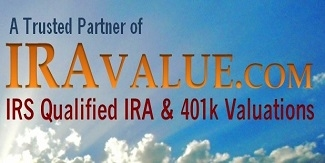Self-Directed IRA and 401(k) Valuation
IRS Qualified Annual IRA and 401K Valuations
The Fair Market Value (FMV) of IRA and 401k holdings must be reported annually. Under most custodial agreements the investment sponsor or owner of a self-directed retirement account is required to arrange for the December 31st FMV to be determined by an independent IRS qualified appraiser.
Valuation estimates by the IRA/401k plan owner or related/disqualified parties are no longer accepted by the IRS, and the original cost or book value cannot be used. The FMV must be determined by an independent, qualified and experienced third party business valuation advisor in accordance with Internal Revenue Code 2512 and Treasury Department Regulations 25.2512.1-6.
If the Fair Market Value must be determined for purposes of valuing an LLC in a Roth conversion, distribution to beneficiaries, as part of a required minimum distribution or other taxable distribution, the valuation must also be signed and attested to by a licensed, qualified and experienced valuation advisor (CPA/ABV, ASA) who is knowledgeable about valuing the business interest held by the IRA or 401k.
New Value, LLC offers special discounted pricing to owners, trustees and custodians of self-directed retirement accounts holding hard to value assets including private equity, LLC operating companies, thinly traded stock, real estate partnership interests, undivided real estate interests (tenants in common), loans, notes and convertible debt.
It has always been the case that Form 5498 required the IRA provider to report the “fair market value” of the IRA as of the preceding year-end. However, until 2015, there did not appear to be any general effort by the IRS to police IRA valuations, which may have encouraged IRA owners and providers to be less than diligent in updating the account valuations of non-publicly traded assets.
For a living account owner who is under age 70½ and who does not take a non-cash distribution or convert his account to a Roth, the annual valuation exercise has no immediate tax implications, but it still must be done in order to properly complete Form 5498 or 5500. To read about the four reasons why IRA owners and providers should take the annual valuation requirement very seriously, Click Here
Frequently Asked Questions
When is an independent IRS qualified valuation essential to avoid tax penalties?
- Whenever there is a noncash distribution, the distributed assets must be correctly valued so the tax liability can be calculated. The same is true for any “deemed” distribution such as occurs with a Roth conversion or prohibited transaction.
- If the account holder is subject to taking required minimum distributions (RMDs), as in the case of an inherited IRA, or if the traditional IRA owner is over 70½, the total account value must be determined correctly in order to compute the required distribution.
- If the owner of the account dies, the account must be correctly valued for estate tax purposes.
- Form 5329 is the form taxpayers must use to report any IRA-related penalties they may owe, such as the 10% penalty for premature distributions (under age 59½), excess contributions (6%), and the 50 percent penalty for failure to take an RMD. Every IRA owner and beneficiary should file Form 5329 every year as part of their personal tax return even if they don’t owe any penalty. A fair market valuation must be performed to demonstrate that this is the case. There is no statute of limitations protection against IRS assertion of these penalties if no return was filed, and Form 5329 is the applicable return. See Paschall, Robert, et ux., 137 TC 8 (2011). If the IRA contains assets without a “readily available FMV” that is one more reason to want statute of limitations protection to shield against later IRS claims that the assets were undervalued for RMD purposes.
Self-Directed IRA/401K Custodians
| IRA Services Trust Company | 1160 Industrial Road, San Carlos, CA 94070 |
| Pensco Trust Company | 555 Market Street, San Francisco, CA 94105 |
| SunWest Trust Company | 3240 Juan Tabo Blvd, Albuquerque, NM 87111 |
| American Estate & Trust | 6900 Westcliff Dr. #603 Las Vegas, NV 89145 |

The IRA and 401K Valuation Experts
For over 20 years, our professional valuation advisors have prepared IRS qualified independent valuations of business interests for management incentive and retirement plans, employee stock ownership plans, employee profit sharing plans, income tax reporting, estate tax planning and corporate finance transactions. We have valued the private equity, debt instruments, intangible assets, intellectual property, options and warrants of several hundred private and public companies.
Our valuation reports are certified to be prepared in accordance with the Uniform Standards of Professional Appraisal Practice (USPAP) and serve as valid defensible evidence to satisfy the strict requirements of the IRS, US Tax Court and state tax authorities.
Our experienced valuation professionals have earned multiple certifications and credentials, including Certified Public Accountant (CPA), Accreditation in Business Valuation, Accredited Senior Appraiser (ASA), Certified Valuation Analyst (CVA), Certified Insolvency and Restructuring Advisor (CIRA), Certified in Financial Forensics (CFF) and Chartered Global Management Accountant.
It is essential that your valuation advisor be ready, willing and able to meet the rigorous standards to qualify as an expert witness in a court of law, and to then competently defend the appraisal report under cross-examination by attorneys on the witness stand before a judge. This is why it is important to engage a qualified, experienced independent valuation expert who is also a CPA licensed to practice before the IRS when obtaining a valuation for tax purposes.
One commonly cited reason the IRS prevails in court cases is the taxpayer’s failure to obtain and present sufficient evidence to support and validate their tax position with an objective valuation report prepared by a qualified and experienced valuation advisor.
We subscribe to multiple industry, public, and private market transaction databases to quickly obtain and organize the market-based measures that are now required by the IRS, Financial Accounting Standards Board and Securities and Exchange Commission to substantiate valuation estimates for tax and financial reporting purposes.
